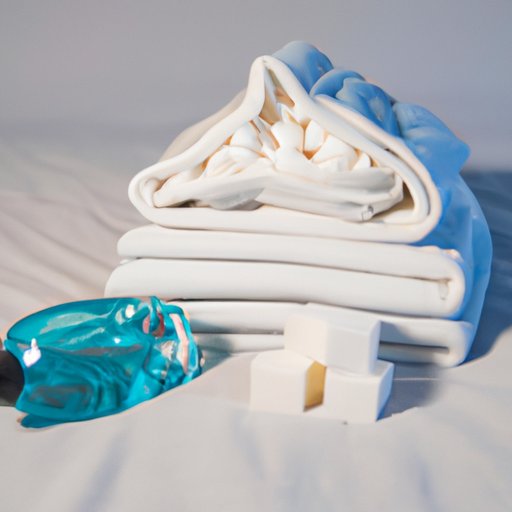Introduction
Having clean sheets on your bed can make all the difference in how well you sleep at night. It’s important to know how often to wash your bed sheets and which temperature setting to use. This article will provide a comprehensive guide on what setting to wash bed sheets and how to make your bed sheets last longer.
How Often Should You Wash Your Bed Sheets?
The frequency of washing your bed sheets depends on how often they’re used. If you sleep in the same bed every night, then you should be washing them once a week. If you use multiple beds, then you should be washing each set of sheets twice a month. Additionally, if you have any allergies or sensitivities, you may want to wash your sheets more frequently.
Here are some tips for making your bed sheets last longer:
- Use a mattress protector to prevent dirt and dust from collecting on your sheets.
- Air out your bedding after each use to reduce moisture.
- Spot clean any stains as soon as possible.

The Best Way to Clean Your Bed Sheets
When it comes to cleaning your bed sheets, the most important factor is using the right detergent. Choose a detergent that is designed specifically for laundering bedding. Additionally, you’ll need a laundry basket, bleach, and a stain remover. Here are the steps for properly cleaning bed sheets:
- Separate your bed sheets according to color. Darker colors should be washed separately from lighter colors.
- Read the care label to determine the appropriate water temperature and cycle length for your bed sheets.
- Add the appropriate amount of detergent to the washer. Use a scoop or capful to measure the detergent.
- Place your bed sheets in the washer and select the appropriate settings.
- Once the cycle is complete, remove the sheets from the washer and place them in the dryer. Select the appropriate heat setting for your sheets.
- Once the sheets are dry, fold them and put them away.
What Temperature Setting Should You Use for Washing Bed Sheets?
Most bed sheets should be washed with warm or hot water. However, there may be some exceptions depending on the type of fabric. Always check the care label before washing your sheets. Hot water is best for killing bacteria, but it can also cause colors to fade and fabrics to shrink.
Cold water is less likely to cause fading or shrinking, but it may not be as effective at killing bacteria. The benefit of cold water is that it uses less energy, so it’s more environmentally friendly. Ultimately, the decision is up to you.
Common Mistakes to Avoid When Washing Bed Sheets
Washing your bed sheets incorrectly can lead to damage or discoloration. Here are some common mistakes to avoid when washing bed sheets:
- Overloading the washer. Make sure you don’t add too many sheets to the washer at one time.
- Not separating colors. Darker colors should always be washed separately from lighter colors.
- Not reading care labels. Always read the care label before washing your bed sheets.

Natural Solutions for Washing Bed Sheets
If you’re looking for an alternative to traditional detergents, there are several natural solutions that can be used. Vinegar, baking soda, and hydrogen peroxide are all effective at removing dirt and odors from bed sheets. Additionally, these natural solutions are better for the environment and won’t irritate sensitive skin.
The key to using natural solutions is to be aware of the pH balance. For example, vinegar is acidic, so it should never be mixed with baking soda, which is alkaline. Additionally, you should always spot test any natural solution before using it on your bed sheets.

Essential Supplies Needed for Cleaning Bed Sheets
In addition to detergent, there are several supplies that you’ll need when cleaning your bed sheets. A laundry basket is essential for gathering and transporting your bed sheets. Bleach is also important for keeping white sheets bright and stain-free. Finally, a good stain remover is essential for tackling tough stains.
Conclusion
Cleaning your bed sheets regularly is essential for maintaining a healthy sleep environment. The frequency of washing depends on how often your sheets are used, and the best temperature setting is usually warm or hot water. When washing your bed sheets, it’s important to separate colors, read the care label, and avoid overloading the washer. Natural solutions such as vinegar and baking soda can be used in place of traditional detergents, and essential supplies like laundry baskets, bleach, and stain removers are also necessary.
By following these guidelines, you can keep your bed sheets clean and fresh. With proper care and maintenance, your bed sheets can last much longer.


